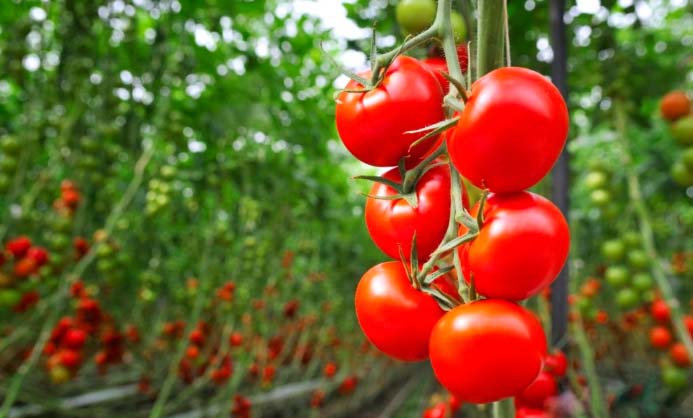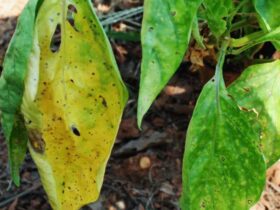Can Chickens Eat Tomato Plants? Yes, but tomato plants are harmful. Unripe tomatoes and the plant’s leaves, stems, and vines contain solanine, which is toxic to chickens.
Chickens are known for their foraging habits, often pecking around for various scraps and plants to consume. While a ripe, juicy tomato can be a nutritious snack for your flock, providing a source of vitamins A and C, it’s crucial to be mindful of the green parts of the tomato plant.
Gardeners raising chickens must ensure these birds don’t have access to the toxic parts of the plant, which can lead to serious health issues. Understanding the dietary restrictions of your poultry is key to maintaining their health and well-being. As such, incorporating tomatoes into their diet requires careful consideration and supervision to avoid any potential risks associated with the plant’s toxic components.
The Love-hate Relationship Between Chickens And Tomatoes
Chickens and tomatoes share a complex bond. On one hand, ripe tomatoes serve as a tasty treat packed with nutrients beneficial for chickens. But, on the other side of this relationship, some parts of tomato plants can pose risks to our feathered friends. Understanding this dynamic is crucial for chicken keepers.
The Nutritional Benefits Of Tomatoes For Chickens
Tomatoes are like a vitamin punch for chickens. They’re rich in vitamins A and C, which help in keeping a chicken’s skin healthy and boosting their immune system. Let’s look at the nutritional benefits:
- Vitamin C: Boosts immunity and combats stress.
- Vitamin A: Promotes good vision and healthy organ function.
- Antioxidants: Fight off diseases and keep chickens healthy.
- Water content: Tomatoes help hydrate chickens on hot days.
These nutrients make tomatoes a healthy snack for chickens when given in moderation.
Risks Involved With Tomato Plants
While ripe tomatoes are safe, tomato plants hide dangers. The plant itself, including stems, leaves, and unripe fruit, contains toxins called solanine and tomatine. These substances can harm chickens if consumed in large quantities. Risks include:
- Toxicity: Solanine and tomatine are toxic to chickens.
- Digestive issues: Can lead to upset stomachs and weakness.
- Unripe fruit hazard: Green tomatoes are risky and best avoided.
Chicken owners should limit access to the plant while allowing ripe fruit as a treat.
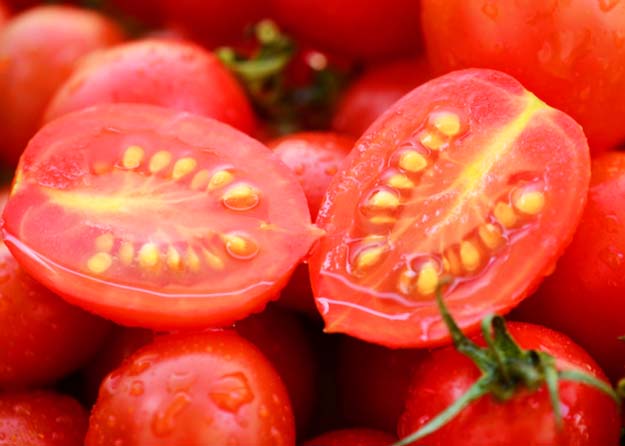
Identifying Safe Parts Of The Tomato Plant
Backyard chickens love to peck around and explore different flavors. One treat that might catch their eyes is the tomato plant. As a chicken keeper, it’s important to know which parts of the tomato plant are safe for chickens and which to avoid. This guide serves as a practical way to understand the treats and threats found in tomato plants for your feathered friends.
Ripe Tomatoes: A Chicken Delight
Chickens can safely enjoy the red, ripe fruit of tomato plants. Ripe tomatoes are packed with nutrients and vitamins beneficial for your chickens’ health. Here are some quick tips for serving ripe tomatoes:
- Cut them into smaller pieces for easy consumption.
- Ensure tomatoes are free from pesticides and chemicals.
- Remove any moldy or rotten parts before serving.
Green Parts: Hidden Dangers
While ripe tomatoes are a treat, the green parts of a tomato plant harbor toxic substances. Parts like stems and leaves contain solanine, a compound that is harmful to chickens. Preventing access to these parts is crucial. Here’s how:
- Block access to tomato plants in your garden.
- Remove green leaves and stems before serving tomatoes.
- Monitor your flock to stop them from pecking harmful parts.
The Toxicity Of Tomato Leaves And Stems
Chickens often peck around in gardens. Tomato plants can catch their eye. But the green parts of these plants hide a danger. They contain a substance called solanine. It’s toxic to chickens and other animals.
The Role of Solanine in Plant Toxicity
The Role Of Solanine In Plant Toxicity
Solanine is a defense mechanism for tomato plants. It helps keep pests away. But it’s not good for chickens. If chickens eat these parts, they could get sick. The red fruit is safe, but the rest is off limits.
Symptoms of Solanine Poisoning in Chickens
Symptoms Of Solanine Poisoning In Chickens
Symptoms should not go unnoticed. Chickens may show these signs if they eat toxic leaves or stems:
- Weakness
- Poor balance or coordination
- Diarrhea
- Difficulty breathing
Quick action is necessary. Removing the plants and calling a vet is vital. Always keep an eye on your flock.
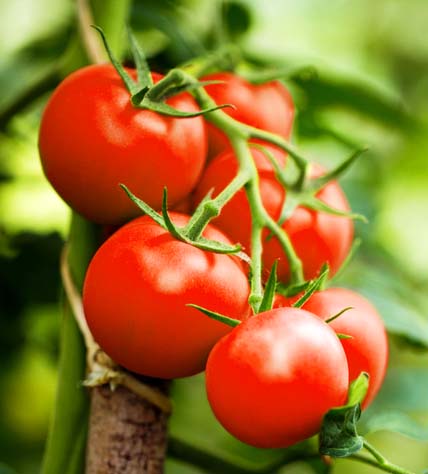
Quantifying Tomato Consumption For Chickens
Understanding the right amount of tomatoes for your chickens is crucial. Chickens can eat tomatoes, but moderation is key. Like any treat, tomatoes should complement their main diet. Let’s explore portion sizes and the frequency of tomato-based meals.
Healthy Tomato Treats: Portion Sizes
Feeding chickens tomatoes can be beneficial, but too much can lead to health issues. A balanced portion ensures they enjoy the treat without risk.
- Small Breeds: 1 cherry tomato per chicken
- Large Breeds: 1-2 slices of a regular tomato per chicken
Always remove the green parts, as they can be toxic to your flock.
Frequency Of Tomato-based Diets For Chickens
Tomatoes are safe in small amounts and should not replace their main feed. Consider the following guidelines:
| Age of Chickens | Frequency |
| Adults | Twice a week |
| Chicks | Avoid tomato treats |
Stick to these rates to maintain a healthy flock.
Growing Chick-friendly Gardens
Growing Chick-Friendly Gardens starts with knowing which plants are safe for your feathered friends. Tomatoes can be tricky. While ripe tomatoes are generally safe for chickens, the plants themselves contain compounds that can be harmful. So how can you include tomatoes in a garden that’s welcoming for your clucking companions?
Choosing The Right Tomato Varieties
Not all tomato plants are created equal when it comes to chicken safety. Start by selecting varieties less attractive to chickens. Dwarf or patio tomatoes, which can be easily secured in pots, often make a better choice for chick-friendly gardens. Here are steps to pick the right variety:
- Opt for large-fruit varieties, which are less likely to drop small fruits that chickens might peck at.
- Look into bush or determinate types as they are easier to manage and protect.
- Choose varieties with strong stems and foliage to withstand curious pecks.
Garden Layouts To Prevent Accidental Ingestion
Designing your garden with chicken safety in mind is essential. A thoughtful layout minimizes risks of accidental ingestion of harmful parts of tomato plants. Consider these garden layouts:
- Use raised beds or containers to elevate tomato plants out of reach.
- Implement physical barriers like chicken wire around your tomato plants.
- Create a separate grazing area with chicken-friendly plants and distractions.
Additionally, training your chickens to stay away from certain garden zones can ensure both happy hens and a thriving garden.
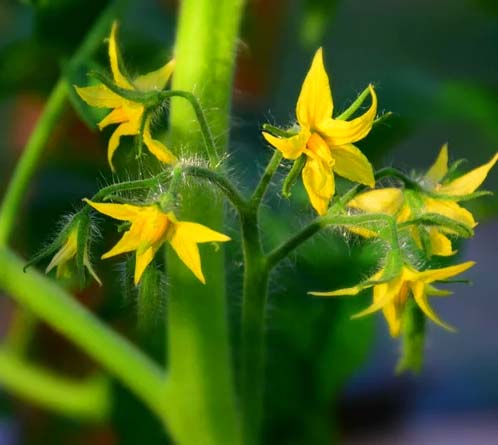
Alternatives To Tomato Plants In Chicken Diets
Chickens enjoy a variety of foods, and while tomato plants are not ideal, numerous alternatives offer both nutrition and enjoyment. These alternatives not only keep chickens healthy but also safe from potentially harmful plants.
Safe And Nutritious Chicken Treats
Finding safe and healthy treats for chickens can be simple. Consider these nutritious options:
- Cucumbers: Great for hydration.
- Carrots: Both the roots and the greens.
- Apples: Without seeds.
- Leafy Greens: Like spinach and kale.
- Berries: Strawberries, blueberries, and more.
- Cooked Rice: A wholesome grain option.
These foods are not only tasty for chickens but also enrich their diet with essential nutrients.
Plants To Avoid In The Chicken Coop
Some plants pose risks to chickens. Here’s a list to keep out of the coop:
| Plant | Risk |
| Tomato Leaves | Toxic when green |
| Potato Sprouts | Contain solanine |
| Rhubarb Leaves | High in oxalic acid |
| Avocado Pits/Skin | Contain persin |
Stick with known safe foods and consult a vet if unsure about a plant.
Understanding Chickens’ Foraging Behavior
Chickens instinctively forage for food throughout the day. Observing their behavior reveals a lot about what they enjoy and what could be harmful to them. For chicken owners, understanding these behaviors is crucial, especially when introducing new plants like tomatoes.
Natural Instincts Vs. Poisonous Foods
Chickens have been foraging for millions of years. Their instincts guide them to a variety of foods. However, not all natural foods are safe. Some plants, including parts of the tomato plant, contain toxins. Tomato leaves and stems have solanine, which is harmful to chickens.
- Safe parts of a tomato plant:
- Ripe fruit
- Unsafe parts of a tomato plant:
- Leaves
- Stems
Training Chickens To Avoid Harmful Plants
Chicken owners can train their flock to avoid toxic plants. Start by keeping chickens away from tomato plants during the initial planting stages. Introduce them only to ripe tomatoes, which are safe to eat.
| Training Step | Action |
| 1. Fence It Off | Use barriers around harmful plants. |
| 2. Positive Reinforcement | Provide safe foods like ripe tomatoes. |
| 3. Supervision | Watch chickens during free-range time. |
Applying these methods creates a safe foraging environment. Chickens will learn to enjoy what is good for them and to steer clear of harmful plants.
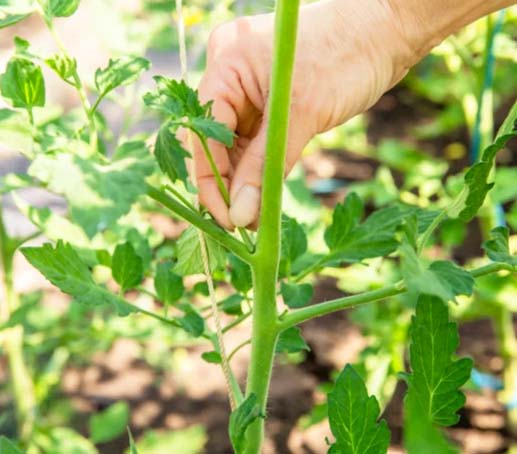
Preventive Measures And First Aid
Preventive Measures and First Aid are crucial when raising chickens and growing gardens side by side. Tomatoes, in particular, pose a risk as some parts of the plant can harm your feathered friends. It’s important to ensure your chickens can’t nibble on harmful parts of tomato plants. But accidents can happen. Knowing how to respond can make a big difference.
Securing The Tomato Patch From Free-ranging Chickens
Keeping chickens safe starts with protecting the tomato patch. It’s essential to use physical barriers.
- Chicken Wire: Enclose your tomatoes with chicken wire. This prevents access.
- Elevated Planters: Grow tomatoes above pecking height. Chickens typically can’t reach High planters.
- Regular Patrols: Check enclosures for gaps. Chickens are skilled escape artists!
Responding To Accidental Ingestion Of Toxic Tomato Parts
Even with precautions, chickens might ingest harmful tomato parts. Act fast if this happens.
- Identify Symptoms: Look for signs like weakness or lack of appetite.
- Isolate the Chicken: Keep the affected bird away from others to prevent the spread of illness and to closely monitor its condition.
- Contact a Vet: Seek professional advice. Timely medical attention is paramount.
- Remove Tomato Plants: Preclude further access to tomato parts by the flock.
Frequently Asked Questions For Can Chickens Eat Tomato Plants
Is Tomato Plants Toxic To Chickens?
Tomato plants are indeed toxic to chickens due to the presence of solanine in the leaves and stems, which is harmful if ingested in large quantities. However, the ripe fruit is generally safe for chickens to eat in moderation.
Are Any Plants Poisonous To Chickens?
Yes, some plants are toxic to chickens, including foxglove, rhubarb leaves, and nightshade species. Owners should ensure chickens don’t ingest these dangerous plants.
What Can’t You Feed Chickens?
Avoid feeding chickens chocolate, avocado, garlic, onions, citrus fruits, uncooked beans, salty foods, greasy items, and raw potato peels. These foods can be harmful to their health.
Conclusion
Understanding the dietary needs of chickens is crucial for their well-being. Tomatoes, in moderation, can be a nutritious treat. It’s important to avoid green parts of the plant, which are toxic to your feathered friends. Always provide a balanced diet to ensure your chickens remain healthy and happy.
Remember, moderation is key.
